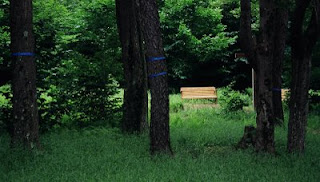
No natural cemetery on par with Ramsey Creek has taken root in Pennsylvania – at least not yet. Two days ago, though, a German company consecrated a three-acre woodland graveyard in the heart of the Pocono Mountains where cremated remains may be buried beneath select maple, beech, birch and other mature timbers that populate the EcoEternity Forest at Pocono Plateau.
"We're providing families with a green place where they can return the ashes of their loved ones,” says Axel Baudach, the founder of the German-based EcoEternity (“FriedWald” in German), which oversees some two dozen green cemeteries in his home country. When they do, families not only "help preserve a forest but establish a relationship to it that is not just about death but life."
As in Germany, the foresters who manage the Pocono Plateau have blazed walking trails through the new cemetery and identified trees suitable for urn burial, typically those that are mature, healthy and easily accessible. On the morning I trekked the grounds with Axel, scores of trees had been marked with blue bands (which you can see in the photo above), so families may easily spot approved urn sites when they tour the grounds, either at time of need or in advance.

When families are ready to inter their "ashes," foresters trench out a hole roughly a foot deep along the drip line of the tree, creating an opening broad enough to accommodate the biodegradable urn the company supplies families. The urn, which is pressed from cornstarch, will quickly degrade. Families may bury their own urn (as long as it will biodegrade) or simply pour ashes into the gravesite. Trees can be marked with simple plaques the size of an index card; no headstones or groundmarkers are allowed.
When I asked Axel how many sets of ashes a single tree can accommodate, he strode the drip line that circumscribes one of the banded trees, each of his fifteen strides, he told me, marking a potential urn site. Burials are offered in three packages. Up to fifteen urns may be buried around a "Family Reunion Tree" ($4,500 for all burials). Groups of friends (up to fifteen) -- neighbors, parishioners, or, as Axel said, members of the local soccer or bowling team -- can find final rest under a "Friendship Tree" ($4,500). An individual can choose to add her urn to a dozen-plus others that surround a "Community Tree" ($500). The cost of interment is an additional $250 (with a ceremony families can plan and conduct themselves) or $175 (without ceremony).
Unlike some other green cemetery schemes, EcoEternity does not own its forest -- and, thus, its cemetery and graves. The company leases those three acres from the Methodist Church, which owns some 750 acres here and on them runs various camps and retreats. Axel's group leases the cemetery property for 100 years; he can't say for sure what will happen to the cemetery when the lease is up, although, certainly, the Church is a good and solvent owner, which is committed to the long-term stewardship of the land. Also, along those lines, the Church agrees to hew to certain eco-friendly practices in its contract with EcoEternity, including not logging the land. A forester, who manages the cemetery property, is hired and paid by EcoEternity.
As Axel sees it, his cemetery scheme is "a win-win for everybody." Families gain a natural environment for that final rest and a welcome wood to visit in life. The church gains some revenue from very gentle use of its land (and one that's in keeping with a Christian dust-to-dust philosophy of life and death). EcoEternity grows a green burial movement that speaks to the needs of families who choose cremation and earns a bit of green in the process.

Axel admits that translating his German-born approach to burial to an American audience presents special challenges. He finds, for one, that his company has to "explain what a forest is" to a trans-Atlantic public that's more estranged from the natural world than are its German counterparts, who tend to regularly venture into their forests for hikes and walks. "We need to motivate Americans to come into their forests and see them for the peaceful places they are." Axel has also been struck by the number of Americans who hold onto their loved ones ashes at home, with no plan to return them to earth or sea. He's hoping his woodland cemeteries will inspire them to plant those ashes in a more natural home.
In the next post, we'll look at modern German funeral and burial practices and why Axel chose to move beyond them. We'll also investigate how the EcoEternity Forest compares to the natural cemeteries springing up in this country.
I'm on the road next week, giving a presentation on green burial at the biannual conference of the Funeral Consumers Alliance in Seattle. Back with a post on July 4th.
Mark Harris
Author, Grave Matters (www.gravematters.us)
